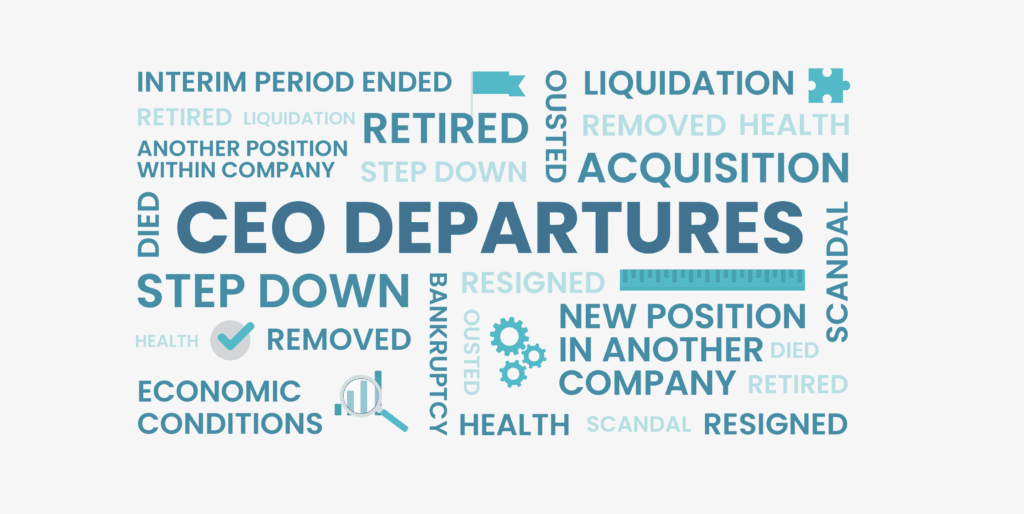There are many benefits and arguments in favor of being the startup founder and CEO. On the other hand, as the startup grows and scales through the early stages and beyond, it can be challenging for a founder CEO to keep up with the fast-changing startup environment.
Contents

Why Step Down as CEO from Your Startup Voluntarily?
As a startup grows, a founder’s leadership skill set may no longer meet the business’ full range of growing needs. Even if the founder CEO meets the new demands of their startup success with skill acquisition to lead and grow the company, a lack of skills or qualities can become a crucial deficit.
When this point is reached, stepping aside for a more qualified CEO to take over is the smartest business decision the founder CEO could make. In many cases, the window of opportunity for a smooth transition in and out of the role of startup CEO is small – waiting too long can mean stifling growth, making wrong hiring or leadership decisions.
New stage attributes, internal startup factors and global impacts can present challenges too great to face alone, or at all. Lack of experience and skill across the many areas of leading a fast-growth company require an honest look at whether the founder CEO still benefits the company as they did in the beginning, while also allowing the startup to continue growing at full speed.
Another scenario is the perfectly-timed and -planned transition from founder CEOs to an appointed successor or the recruitment of an external CEO who brings the experience and skill set needed to take an already successful company to the next level.
When Should the Startup Founder CEO Step Down?
Ideas are a commodity. Execution of them is not.
Michael Dell
From idea to startup stage, the founder’s knowledge, personality and charisma is important as they attract their first employees, pitch the idea to receive funding, and reach out to a network of like-minded entrepreneurs.
As the startup grows, more formal processes and structures across the entire company are needed. Driving collaboration between teams, hiring a leadership team and embedding a strong company culture are aspects an early-stage founder CEO did not need the skills for. Now, this lack of skills is hindering the startup to grow at its potential.
Analyzing your startup for warning signs and red flags may help to determine that it’s time to bring in a new CEO.
Signs and red flags: it's time for a new CEO

There are not many companies that get to this level.
And there are not many founders that choose their company
over their own ego.
I know we will prove this was the right move.
Twitter co-founder Jack Dorsey announcing his resignation as CEO to the company
1. Your startup's growth has become is stagnant
If “the strategic stuff” isn’t for you, it can be the right time to bring a CEO in who is able to create and implement a business strategy for your startup.
2. Building a leadership team
As the startup grows, a full range of leaders and managers are needed. Having an executive recruitment firm find the perfect candidate can save time to focus on other areas of the business.
It’s vital that the CEO is still part of the hiring process. If interviewing and building the teams your startup needs is not for you, it might be time to bring in a new CEO and focus on the parts of the business you love.
3. Meeting with employees, investors, or customers
A day full of meetings is not unusual for a founder CEO. From employees to the leadership team, to meeting with investors or potential clients, it’s a big part of the day.
If that’s not what brings you satisfaction and results in positive outcomes for the startup, it’s a sign you’re ready to find a CEO for your company.
4. Missing the early startup days
As the leader of a rapid-growth startup, stating that the CEO has a full time job is an understatement. Their involvement in every aspect of the business from vision to strategy, hiring and shaping more efficient processes, the entrepreneur of the early startup days has to allocate time differently now, acquiring new skills as the company scales.
Some entrepreneurs enjoy this part of being the founder CEO. However, some enjoy what the startup was all about at the beginning – the bright idea, building the prototype, working on it with a small team.
5. Your Company is Going in a Different Direction from Your Vision
Jane Stevenson, Vice Chair at Korn Ferry
Scaling, strategizing and transforming the business means keeping up with changing demands, challenges, trends, and global impacts. If this is stressful, exhausting or frequently requires skills that are not a strong point, it might be time to step down as CEO.
6. It's time to Re-Focus
Jane Stevenson, Vice Chair at Korn Ferry
This holds true for many leaders. From founders and CEOs to senior managers and board members, shifting the focus to a new priority. Especially since the pandemic, shifting the focus to what you truly want has become a more frequent reason to hand over the reins.
Hire Your Startup CEO with Key Search
We help some of the world’s most exciting startups and fast-growth companies hire their leaders. Our expertise, in-house research and assessment tools, as well as individual 24/7 access to our custom progress and statistics tool to help you hire the perfect CEO for your startup.
Set up an introductory call with our team of executive recruiters to find out more about how Key Search Executive Search can help you hire your leader.
